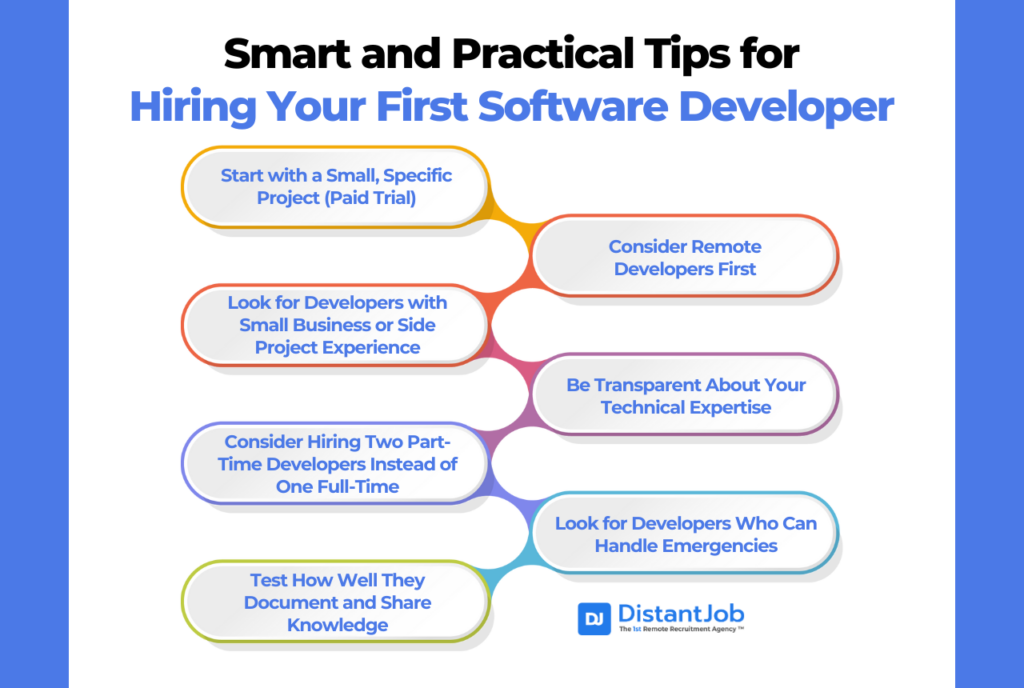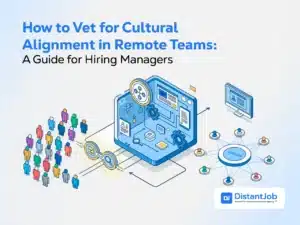Want to hire software engineers who truly elevate your business? With U.S. companies dedicating 63% of their software budgets to new development—and projects typically costing between $30,000 to $100,000—hiring mistakes aren’t just costly; they’re growth killers. For SMBs that can’t match Silicon Valley paychecks, how can you attract top-tier talent? How do you implement structured technical interviews that measure genuine problem-solving skills, rather than memorized solutions? What’s the best way to evaluate candidates using practical, paid trial projects within your own codebase? And how can you effectively assess team compatibility beyond vague notions of “culture fit”? This guide provides seven actionable strategies for hiring software engineers effectively from day one.
Smart and Practical Tips for Hiring Your First Software Developer

Start off by looking for a few essential qualities: adaptability, strong tech know-how, and the capacity to fly solo. To smooth the process, try beginning with a trial project, prioritizing candidates with the right background, and leveraging remote hiring. Doing so can help you get the perfect match without overstretching your finances.
To help you with that, here’s a quick guide to these strategies so you can make the right choice for your team, stress-free:
1. Start with a Small, Specific Project (Paid Trial)
Before actually adding your first developer to your squad, go for a two-week paid trial project instead of just any job. This approach sets clear deliverables and measurable outcomes for both you and the developer, letting you check out their coding skills, their problem-solving abilities, communication style and ability to handle feedback. By doing so, you can zoom in on a brief specific task, minimizing long-term risk while getting a clear picture of the dev’s work quality and fit with your team culture.
While testing the waters during these two weeks, both you and the developer can get a feel of how well you work together, set realistic expectations, and make sure you’re on the same page. If the coder’s game is right on track with what you need, you’re all set to make them a stable member of your crew with a cool head.
Pro Tip: Set definite objectives and what you expect right when the trial kicks off. This method lets you judge the developer’s organizational skills and how they share updates—qualities that are vital for smooth onboarding and team consistency.
2. Consider Remote Developers First
When you bring remote developers onto your team, you tap into a global talent pool. Besides, you also save money, since you can get these pros for about 20-30% less than local experts, which is a big plus for cash-conscious startups and small businesses aiming to stretch their dollars.
Also, hiring remotely provides flexibility, which in turn allows you to start developers on a part-time or project based jobs, before deciding on a full-time commitment.
And there’s more good news—studies found that 54% of software developers report being more productive when working remotely. This increase in productivity kicks projects into high gear and results in some top-notch work for your business.
Pro Tip: Establish clear communication channels and often touch base with your remote devs. This way, everyone stays on the same page, you can count on their work, and you help create a great culture for working right off the bat.
3. Look for Developers with Small Business or Side Project Experience
Developers with small business or side project experience tend to bring the savvy thinking startups crave. They’re all about self-management, deciding what’s top of the list without constant oversight, and adapting to lean operations. This background signals they’re not just great at what they do but also excellent at making do with what they’ve got and juggling ever-changing goals—traits that make them fit right into the quick and nimble startup scene.
When you hire developers who’ve done well in small-scale settings, you land team players ready to dive into action even in a tight spot with not many resources. These developers solve problems on their own and can adapt fast, which is key for an up-and-coming business that faces constant change.Pro Tip: In the interview, ask them about a specific side project or small business role they’re proud of. This can give you a peek into their creativity, drive, and skill to work well with limited resources.
4. Be Transparent About Your Technical Expertise
When you’re looking to hire, you must be straight about your technical knowledge you actually have. Lay it out right from the get-go. This makes figuring out whether the dev can handle your demands and if you’re up to speed to judge their smarts a whole lot smoother. If tech stuff isn’t in your ballpark just tell them. Keeping it real prevents mix-ups and keeps everything rolling without a hitch.
By keeping things crystal clear, you set up a collaborative atmosphere where the coder can fill you in making things easy to get, in a way that’s clear and accessible to you. This allows them to adjust their feedback and explanations to fit your knowledge level, so you’re on the same page, all the way through to wrap-up.
Pro Tip: To measure a developer’s skill, ask them to break down a technical idea as if they’re talking to someone who isn’t into tech. This way, you figure out how much they know and if they can talk about it in simple terms you get.
5. Consider Hiring Two Part-Time Developers Instead of One Full-Time
When you’re putting together your startup team, going for two part-time developers instead of a single full-timer can be a clever tactic. This play isn’t just good for risk distribution—if a coder hits a wall in the project or becomes unavailable, the other’s right there to keep things rolling. It also means you get a mix of talents on deck. Picture this: one’s a wizard at front-end development, and the other’s a pro on the backend stuff. That way, you’ve got a well-rounded team without tying someone down full-time.
With two part-time developers, you’ve got more room to play around. You can try out different ways of working and give tasks based on what each developer is good at making sure you’re covered from all sides.
Pro Tip: When you’re talking to possible hires, try to find two part-timers whose skills match up well. This helps you get the most out of your team and lets you handle a wide range of jobs well.
6. Look for Developers Who Can Handle Emergencies
For a startup, hiring developers who can think fast when the pressure’s on is gold. Developers ready for emergencies keep their cool, spot problems quickly, and fix them under stress. During interviews, ask candidates to tell you about times they’ve dealt with crises—like last-minute glitches before something big goes live, or when things crash while being live. Look for stories where they not only fixed the issue but did it fast and without much help.
Such devs take the initiative to tackle big problems on their own, cutting down on potential downtime and making sure any technical slip-ups don’t mess up your workflow.Pro Tip: Discover how candidates handle urgency by running them through a made-up crisis scenario that fits your startup or small business. This shines a light on how they tackle problems, their thinking style, and if they can keep their cool when things get tough.
7. Test How Well They Document and Share Knowledge
In small companies and startups, everyone’s work must be clear, easy to access, and simple to understand. Coders who document their code and steps allow your business to move forward without getting stuck due to unclear practices. During the trial run, see how well a candidate documents their work. Good documentation proves they’re ready to share what they know and this prepares everyone for smooth team additions and growth down the line.
A project with good documentation serves as a guide for newcomers or team members joining later. This results in shorter onboarding periods and more time for new ideas.Pro Tip: During the trial stage, request the developer to document a specific task or function in writing. This way, you’ll see how clear they are and whether they’re good at looking ahead, which is perfect for when you’re planning to scale your crew.
Important Factors for North American Startups and Small Businesses to Consider When Hiring Developers
For North American startups and small businesses looking to hire software developers, it’s crucial to find people with specific skills and traits who can do well in a fast-moving changing environment. Begin by searching for people who can adapt to a startup’s changing priorities. Developers who have worked as freelancers or in smaller teams often find it easier to deal with project changes and meet new demands. During interviews, ask about times when they had to change direction or handle a sudden shift. This ability to be flexible will keep projects going even when priorities change out of the blue.
Choosing devs with an eye for scalability is smart—those who plan for the future and create code that can expand with the company. Search for candidates who have experience reworking systems or adding features gradually. They tend to make sure your tech stands strong and switches up easily when your company gets bigger.
Finding a balance between cost and essential skills is another key factor for startups. Hiring developers who work remotely from cheaper areas can deliver high-quality work within budget to those skilled in quick prototyping or using the right tools to speed up schedules. This approach allows startups to get the most value without overspending their limited funds.
Beyond technical skills, hiring people who fit your company culture, not just those with the right technical abilities, plays a crucial role in creating a united team. Developers who excel in small, team-oriented, and sometimes stressful environments have a higher chance to do well in a startup setting. Search for candidates who can adjust how they communicate and add to a team-focused culture.
Lastly, especially when remote work is involved, seek developers who bring structure to remote work. A go-getter well-organized approach is vital in a remote setup where self-control and clear communication make a big difference in getting things done and keeping projects on track. Ask candidates how they manage their time and what tools they use to stay organized; this can show how well they’ll fit into your team and way of working.
Conclusion
Hiring the right software developer for your startup or small business can change everything, pushing new ideas and expansion. Starting off with small, paid trial projects and being open about your tech know-how builds a solid base. From looking into remote options to considering part-time hires and hunting for coders who are “ready for anything,” these tips help you build a team that fits what you need while making the most of your money.
Finding developers who bring structure to remote work, are adaptable, and think with scalability in mind is key for new companies. Focusing on a mix of main skills and team fit, while keeping an eye on costs, lets you put together a dependable forward-looking team without stretching your resources too thin.
Hiring remotely grows your talent options and cuts expenses by up to 30% making it a top pick for small companies. The freedom of part-time or project work lets you adjust hires as your needs change, helping you stay flexible in a tough market.
At DistantJob, we link North American businesses with top-notch, pre-vetted remote developers who fit well both in skills and culture. With our comprehensive IT staffing solutions help you speed up hiring lower risks, and find skilled coders ready to meet your specific business aims. Ready to build your team? Contact DistantJob today!





